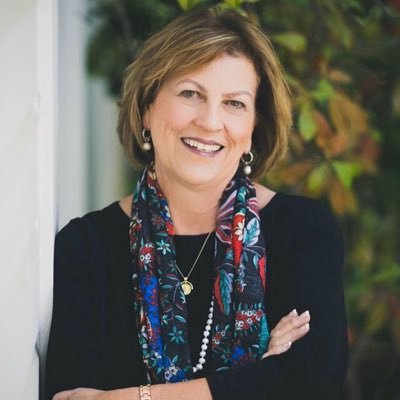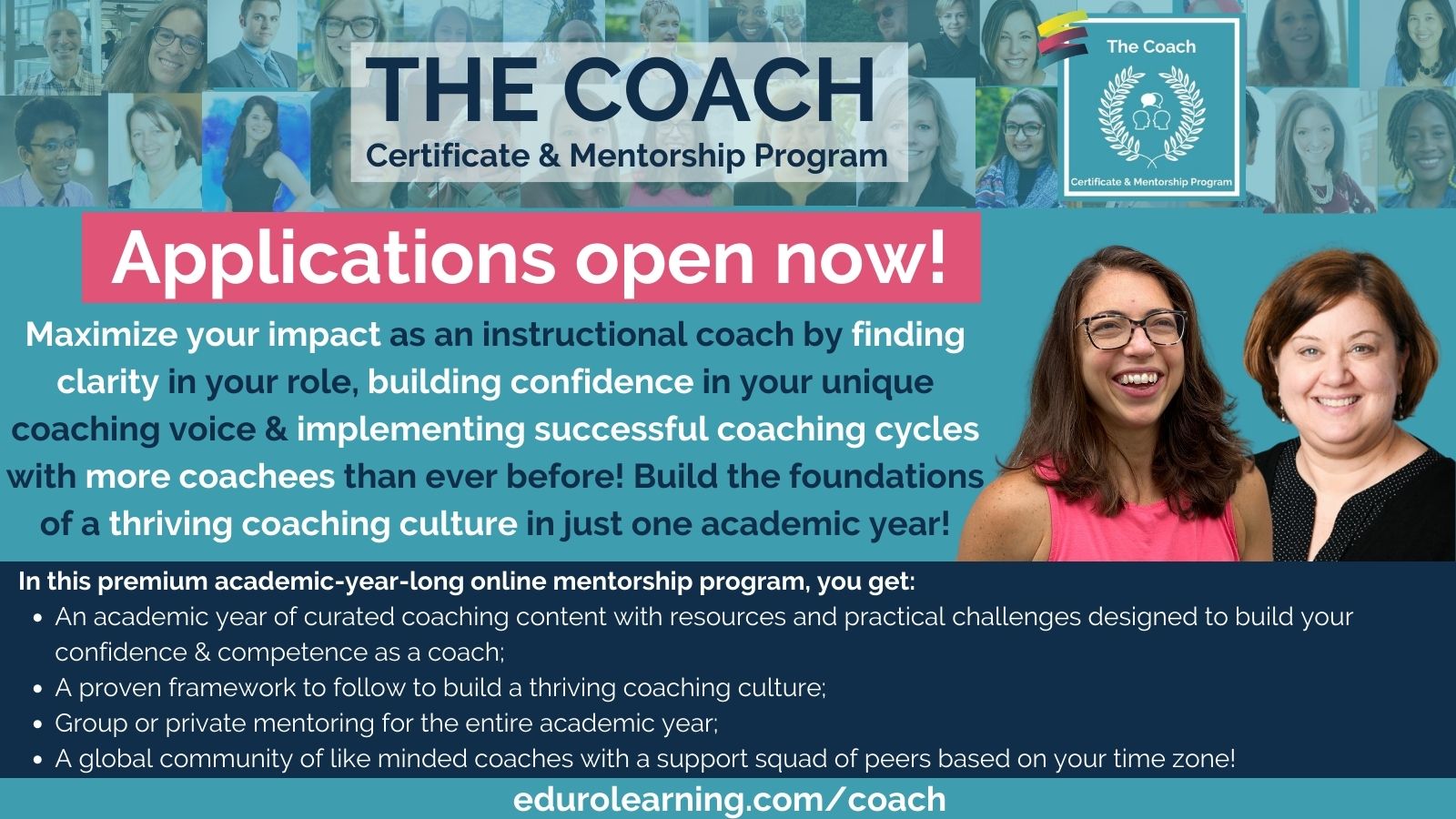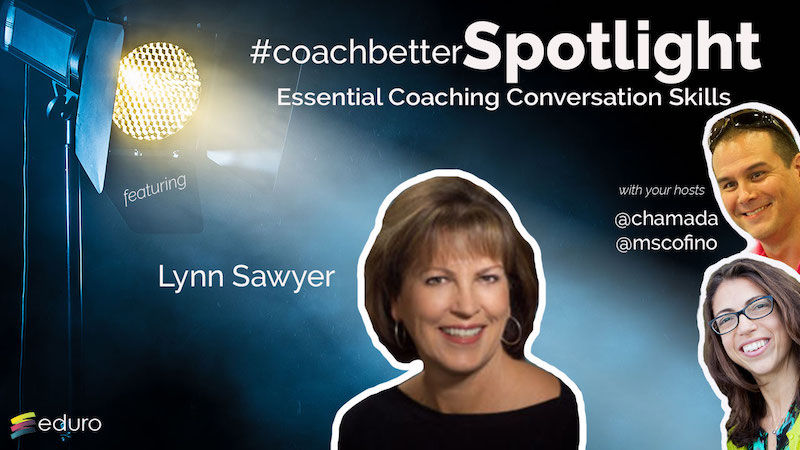Welcome back to another episode of #coachbetter! In today’s episode, Clint and I are chatting with Lynn Sawyer, experienced Cognitive Coach and international education consultant. Lynn has worked with Cognitive Coaching and Adaptive Schools for almost her entire educational career and this conversation gave us an amazing breadth of understanding of not only the history and evolution of Cognitive Coaching, but also many practical takeaways for how to implement this practice in your coaching right away. Both Clint and I were re-inspired to dig deeper into Cognitive Coaching again after being reminded how powerful the process can be when implemented successfully.
Subscribe to #coachbetter via your favorite Podcast Player!
Featured Guest

Bonus! Watch the Spotlight Version on YouTube!
SHOW NOTES
Lynn Sawyer is an international educational consultant, presenting workshops and seminars on Cognitive Coaching, Learning-Focused Supervision, Facilitating Collaborative Groups, Mentoring Matters, Presentation Skills, Data-Driven Dialogue, Habits of Mind, and Coaching the Framework for Teaching.
Lynn Sawyer has been an alternative high school teacher, curriculum specialist, and professional developer. She was Director of Professional Development for the Washoe County School District, Reno, Nevada,for 20 years. She led a district-wide implementation of a teacher evaluation system based on “A Framework for Teaching,” (Danielson, 1996, ASCD).
She is a Training Associate for the Center for Cognitive Coaching, MiraVia, ASCD Faculty, Center for Adaptive Schools, and the recently established Danielson Group.
Please tell us a little bit about Cognitive Coaching. How is it different (or similar) to other models? What makes it so successful?
We all want our coaching work to be (1) transformational, that it really truly makes a difference in the way that humans operate with each other; that it’s (2) scalable across the organization, not just a pocket; and (3) sustainable so that whatever these sets of skills are have sticking power beyond the changes in leadership, conditions of the world, finances, etc.
When we think about Cognitive Coaching, the mission is “helping people become self directed persons with cognitive capacity for excellence, both independently and as members of a community.”
Teaching is such a complex intellectual activity. So many things that have gone on in our field have not honored the complexity. Cognitive Coaching is about coaching the thinking of a person.
Some questions I might ask would be:
- As you think about this new group of people you’ll be working with, and what you know about their particular situation, what are some things that influence what teaching decisions you make right at the opening of a workshop?
- Given what you know about your group, what are the things that might present themselves as challenges or obstacles?
- Considering that there are some people who might not be happy to be in your workshop? What are some things that you do to win their emotion about being there? What are the things you can do to get them on board?
Cognitive Coaching is about questions with legs. They take you somewhere.
The cognitive processes of instruction are the things that happen in the head of a teacher, before, during and after teaching. The idea is to help teachers become more self-directed so that they don’t need us.
Questions coaches can ask for teachers: What are the things I was happy about today? What connections was I making? What decisions did I make?
The depth of the questions CC ask are amazing. Is this just a natural skill or can anyone build that skill set?
We all started that way. The skills and tools of CC are teachable and learnable.
There are micro-skills:
- paraphrasing
- How to ask a question: instead of “What’s your objective?” “Given what you know about your students, what are some of the learning outcomes?”
- Multiple alternatives: “some” of the objectives
- Positive presuppositions: “As you think about what you know about your students, what are some strategies you are considering?”
- Asking teachers to envision what they want to see: “As you think about the momentum in your classroom, and as you picture it the way you want it to go, what are some things that you see and hear what students are doing?” “When you say “really quickly” and you think about what that is to you, about how long do you want it to be?” “What is it that students might not be aware of as you give them instructions to do a transition?”
Unpacking student engagement. What really is that? How do you get them continuously and simultaneously engaged? What are the critical attributes that you want to happen?
When do you offer direct consultation vs coaching? How do you know when that person doesn’t know what they don’t know? And then switch?
“You can’t coach out what’s not in there” – Art Costa
4 support functions
Coaching, collaborating, consulting, evaluating
There are times when teachers don’t have the skills yet. They’re on the way to getting those. At those times we would do a consultation. Options:
- Offer a menu (at this point, you have several choices, which one would you picture yourself doing? Suggest offering 3 possibilities, because the choice is still for the teacher. Here are 3 things that teachers have done to be successful at XX, they do 1 2 or 3, which do you see yourself doing?)
- Self Directedness: self-monitoring (balcony viewpoint, looking at your own performance, criteria for considering what is acceptable to you, metacognitive, thinking about your thinking while you’re doing it); self managing (learning from past experience, deciding what you should keep and what you should throw out, what you should experiment with doing); self-modifying (take all that information and apply the new learning).
Professional Growth vs Supervision
In the past, the heavier load was on the supervisor, now the lifting is more equal. The person who is coaching, is helping that teacher unpack that lesson.
Supervisors / Coaches can ask: How did what happen, compare to what you wanted?
One of the many subskills of CC has to do with naming the type of cognition you’re asking the teacher to do. “As we finish today’s lesson, what are some of the things we learned today the same or different than what we learned last week?” “What are some generalizations you’re making about the learning?” Can use Bloom’s as a starting point for the types of questions you can ask.
How do you get started?
Sentence stems for positive supposition:
Given what you know about your students….
Because you care a lot about involving the parents…
Suggest: isolate them, and learn them, and rely on them until you’ve internalized them
Paraphrasing:
Acknowledging you’re thinking or you’re feeling because…
Summarizing (what are the containers that this might go into?) On one hand, you’ve got a lot of automatic skills related to your lifting, on the other hand you’re really examinating the tiny skills that lead to successful performance. If we’re going to talk about one of those, which would be most useful for you right now? Last year you were working on this skill, this year this one, next year… You’ve got 3 things that concern you, X, Y, and Z.
Abstracting: going from concrete to abstract: beliefs & values and big ideas. “An assumption you operate from is xxx, but to continue xxx”
Rehearse skills during training using a memory mat with those stems
“There are concrete skills that we need to practice in order to internalize to become the fluid practitioner we would like to be.” – Kim
It’s ok to use scaffolds during coaching. There is no harm in being absolutely transparent in the process your taking on. It may inspire curiosity and interest in the teacher using these tools with students too.
There’s also no harm in “doing a rewind” if you realize that you want to change the question you ask
How does the culture of coaching transition to teachers coaching students?
When our thinking gets changed by these questions, we understand the power and value that, and want it for our students.
As teachers learn to reconstruct their questions, they might shift away from “any questions?” at the end of a lesson to…
- Take a moment, consider what we’ve just been talking about. In 30s be ready to ask a question about what you’re not clear on.
- With your learning partner, spend a moment saying to each other what you wish I would explain a little more clearly. I want to hear from 6 of you.
- Given the fact that you all have a lot of different things that take your attention, what are some of the strategies that could help you get started on your homework? Turn to your neighbor and share. I want to hear from 6 of you.
All levels of questioning are valuable:
- Recall: “Thinking back on the first half hour of the lesson, what are the things you’re remembering?”
What have you seen that works / doesn’t work? Key takeaways from working with so many schools?
Curious about ideal ratios: how many teachers can you reasonably support, coaches:teachers, # of coaching cycles in an academic year, how often to meet with teachers?
Level Up Your Coaching with The Coach!
If you are ready to dive deep into your coaching practice, to help you #coachbetter and build a thriving coaching culture in your school, please join us for our next cohort of The Coach!
Wherever you are in building a coaching culture in your school, The Coach will give you the strategies, skills and tools you need to make coaching a success and will empower you to confidently apply instructional coaching strategies in any situation – from building a coaching program, to having coaching conversations, to being a leader in your school community. We facilitate only one cohort each academic year so we can offer individualized support for each participant.
Coaches of all levels are welcome: you’ll start the program with a self-assessment to determine exactly what the next steps are for you!
Registration for our next global cohort opens once a year – check the website for details!






Recent Comments